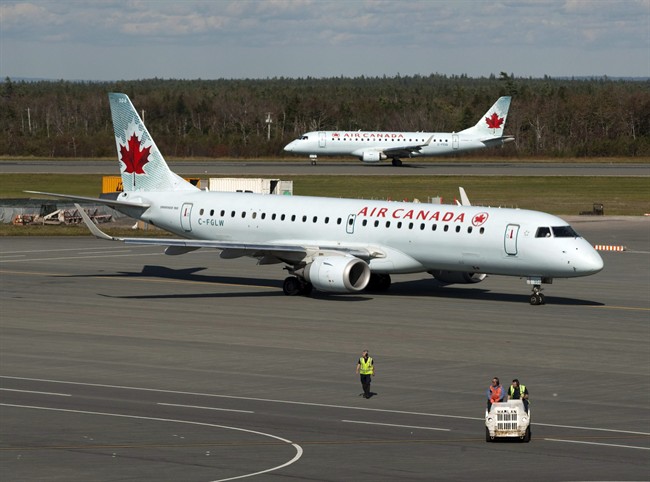MONTREAL – The dramatic recovery of Air Canada’s shares took a step back Monday, falling more than 12 per cent after the carrier warned of disappointing first-quarter results that may signal a softening in the airline industry.

Air Canada (TSX:AC.B) shares closed down 38 cents at $2.62 Monday afternoon on the Toronto Stock Exchange after the airline reported preliminary results that included a bigger loss than investors expected, in part due to stormy winter.
Trading volume was extremely heavy at more than 5.5 million shares compared with less than 400,000 on an average day.
The stock had been on a tear, rising from a low of 82 cents last year to a peak of $3.40 earlier this month.
The country’s largest airline, which reports actual results May 3, said it expects the quarterly net loss will be about $260 million, compared with a net loss of $274 million a year earlier. No estimate for quarterly revenue was given.
Adjusted for one-time items, Air Canada expects a loss of $143 million compared with an adjusted loss of $162 million in the first quarter of 2012.
Analysts had been expecting the airline to post an adjusted loss of $120.4 million, or 40 cents per share, on $3 billion of revenues, according to those polled by Thomson Reuters.
Analyst Chris Murray of PI Financial Corp. said the results were a little “light” but didn’t warrant the stock’s price drop.
“I think the sell-off has been much too sharp given the numbers that they’ve put out,” he said in an interview.
David Tyerman of Canaccord Genuity said Air Canada’s high debt and hefty pension obligations magnify the reaction to both positive and negative news.
Although the results were more in line with his expectations, he said investors may be worried by the impact of capacity growth plans on revenues and yield.
“I think that it is spooking investors potentially and analysts because there’s an anxiety out there already about capacity increases so I think this is just reinforcing it,” he said.
Walter Spracklin of RBC Capital Markets reduced his target price for Air Canada shares by 25 per cent to $3 due to lower than anticipated yields.
He said the weaker than anticipated revenue and yields may be pointing to growing industry headwinds, aggravated by continued softening in leading macroeconomic indicators.
“Considering these headwinds on the back of significant spike in share price year over year, we continue to believe that a valuation pause is warranted,” he wrote in a report.
Air Canada said it issued the preliminary report ahead of the full results on May 3 to comply with disclosure rules as it explores a range of debt financing options.
It didn’t disclose what financing options are being considered.
Analysts said the airline could be renegotiating high-yield bonds or could become the first Canadian airline to tap into a new way to finance aircraft purchases that reduces interest rates.
Murray said Ottawa’s approval in December of an aircraft protocol opens the doors to the “enhanced equipment trust certificate” (EETC) market that has been used by U.S. carriers for nearly 20 years.
He pointed to reports suggesting the airline will arrange a $600-million EETC transaction for six new Boeing 777 aircraft. Murray added in a report last week that Air Canada may also consider this financing for its new Boeing 787 planes set to begin delivery next year.
As of the end of March, Air Canada estimates it had $3.987 billion of adjusted net debt – $246 million less than a year earlier.
The adjusted net debt includes Air Canada’s lease obligations as
well as long-term debt, reduced by the value of its cash, cash equivalents and short-term investments.
Air Canada said the most recent quarter included a $10-million hit due to flight cancellations and delays caused by severe weather conditions.
It also had a higher proportion of leisure passengers than business travellers in part due to an earlier Easter holiday.
The airline recorded a $24-million accounting item related to the impaired value of Airbus A340-300 passenger jets.
In its revised outlook, Air Canada said it expects its adjusted costs per available seat mile to improve more this year than previously anticipated, based on better than expected performance in the first quarter.
The airline’s adjusted CASM increased 1.4 per cent compared with the first quarter of 2012 rather than an anticipated increase of between three and four per cent.
As a result, Air Canada said it now expects 2013 full-year adjusted CASM to fall by 0.5 to 1.5 per cent from last year – an increase of half a percentage point at both ends of the scale.
The airline said its operating loss for the first quarter will be about $106 million, compared with $91 million a year ago, while EBITDAR (earnings before interest, taxes, depreciation, amortization and aircraft rental) will be $145 million compared with $174 million a year ago.
The airline maintained its prior forecasts for domestic and system-wide capacity growth in 2013. It expects available seat miles will increase by 1.5 to 2.5 per cent across its network, while domestic capacity will grow 0.5 to 1.5 per cent.


Comments